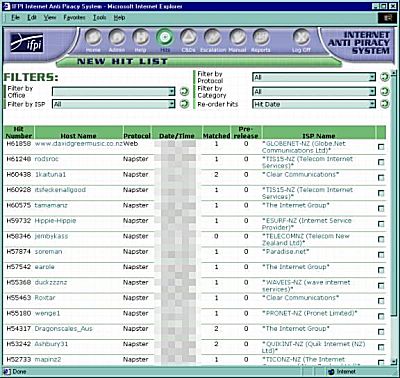gday wees ons op een wel heel merkwaardig stukje tekst waarin het geheime wapen van de platenmaatschappijen in de strijd tegen copyright-schendingen. Het Internet Anti Piracy System (IFPI) maakt gebruik van een stuk geavanceerde stofware dat de naam "Media Tracker" draagt. Deze software is in staat om op peer-to-peer netwerken zoals Napster en Gnutella in te loggen, search engines door te spitten, IRC kanalen passief in de gaten te houden, nieuwsgroepen te lezen en door FTP sites heen te browsen. Tijdens de zoektochten wordt een grote database samengesteld met al het copyright schendende muziek-materiaal en de providers van de overtreders. Door de gegevens aan justitie en de betreffende ISP door te geven worden deze bijna verplicht om actie te ondernemen. Mensen die zich veilig voelen omdat niemand is staat is om alle illegale MP3 bestanden op internet in de gaten te houden zouden dus wel eens bedrogen kunnen uitkomen:
By performing structured queries of the database, recording companies are able to produce a list of offending machines, IP numbers and connection times for any ISP. Word is that this information will be regularly sent to ISPs whose users are breaching copyright with a demand that, in the first instance, the ISPs take action to stop those users re-offending. The system is capable of performing follow-up queries of machines that are known offenders and if found to still be breaching copyright, legal action could be launched.
Forcing the ISPs to police their own customers (or perhaps face legal action as a contributing infringer) is a smart way to stem illegal music exchanges online. With an automated process, larger ISPs could be deluged with warning notices and soon find the cost of following up those complaints to be significant. It's a smart move on the part of the recording industry and may effectively force ISPs to join the battle against piracy.
The ISP industry's response to the system remains to be seen but it could backfire. What happens if they start clearing their access logs on an hour-by-hour basis in order to honestly claim that they are unable to identify the offending parties by their IP numbers? It would appear that the recording industry is now trying to box smarter -- but have they underestimated the Internet and its users?

